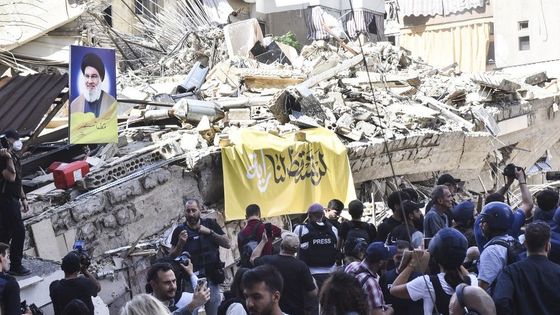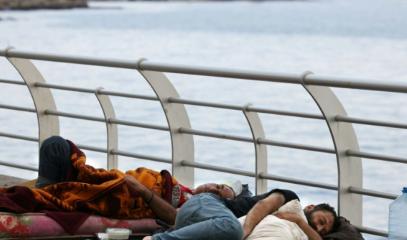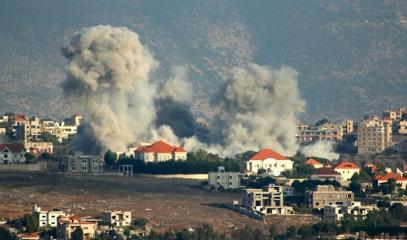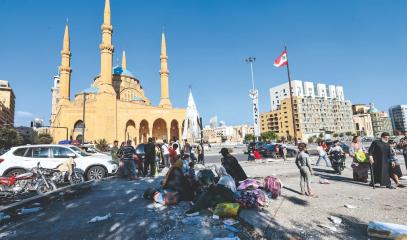With the war on Hezbollah, Netanyahu is trying to widen the Christians-Shia divide
While they may be divided over the conflict between the Party of God and the Jewish State, Lebanese movements and parties are united in defending the country’s territorial integrity. The humanitarian emergency is getting worse as more and more people are displaced, but expressions of solidarity are also multiplying. Political analyst says the Israeli prime minister is trying to cause a religious war within Lebanon, splitting Lebanese society.
Beirut (AsiaNews) – “10,452 square kilometres, not an inch less” reads a small box permanently displayed on the screen of the OTV channel, which belongs to the Free Patriotic Movement (FPM) of former president Michel Aoun, a message primarily addressed to Israel.
The box means that while the FPM – like many other parties and leaders – disavows the open war that Hezbollah has waged against the Jewish state since October 2023 to the detriment of all Lebanon and in defiance of the country’s official authorities, it also opposes and will oppose any Israeli desire to annex any part of Lebanese territory, under the pretext of self-defence.
In this regard, the picture of an Israeli flag flying at the border village of Maroun el-Ras, shown yesterday by the Israeli army, did not reassure the public. On the contrary, many welcome the resistance to the advance of the Israeli army, which claims to want to free the Lebanese from the heavy grip of the Shia party, but which has already inflicted on the country 2,000 dead and 10,000 wounded, and thrown 1.2 million people onto the roads since 23 September.
“Israeli officials have spoken of their intention of reoccupying Lebanon as far as the Awali River, where the presumed tomb of an Old Testament prophet is located," said a wary political scientist who preferred to remain anonymous.
“With Netanyahu, the war is taking an increasingly religious turn," he added. “The systematic destruction of certain localities in the south and the suburbs suggests that Israel wants to proceed with a forced displacement of the Shia population, a demographic reshaping of Lebanon. Moreover, for MP Jamil Sayed, this war is not being waged against Hezbollah, but against the Shias. It's a pre-established plan."
“At the same time," he concluded, “I think that Israel hopes to lay the foundations for a future sectarian conflict between the Shia and Christian communities in Lebanon.” It is in fact above all the Christian regions that are the places of refuge for the displaced.
Evacuation orders
On a human level, the Israeli army's evacuation orders affecting dozens of Lebanese villages in the region south of the Awali River, now forbidden to residents, have deeply shocked and wounded the communities concerned. Verbal assurances have been given that this departure is temporary, but the Lebanese, leaving their homes and possessions with bruised hearts, know that the Jewish state has become a master in the art of disinformation.
It goes without saying that, logistically, the daily bombings and evacuation orders have caused an unprecedented humanitarian crisis in the country, which was taken by surprise by its scale.
Originally from Akkar (northern Lebanon), Ghassan A, a delivery man in a media company, has taken into his home 20 members of his wife's family, a native of southern Lebanon. “I really didn't need this!" said the man who has just become a father for the first time and is thinking about the coming winter.
International relief has begun to pour in, but this aid is going to official organisations and to hastily set up shelters. Displaced people who found refuge with relatives or locals are deprived of it, due to a lack of "visibility". What is more, the flow of displaced people is rising by the day, especially in Beirut, which is home to nearly half of the new homeless, and where low-rent residential complexes built by Hezbollah and of no military interest have been razed to the ground in pure acts of revenge.
But the arrogance of Shia militiamen is not dead. In the capital, Christian schools were forcibly requisitioned by men of the Amal movement, says a source with the French L’Ouevre d’Orient association in Beirut.
However, the examples of spontaneous reception compensate for this black spot. In fact, if we disregard political disagreements, this internal exodus has offered the country many precious opportunities for inclusion, explains Father Elias Chataoui, a Greek Catholic priest in charge of a school in Beirut.
But this still calls for some getting used to; for example, a 58-year-old housewife explains on condition of anonymity the fear that gripped her neighbourhood after the arrival of a very religious family in the building, whose women were veiled in black, from head to toe.
Elijah, who only gave his first name, said that no one in his Christian village near Beirut has rented to the displaced for fear of sheltering a Hezbollah leader and becoming the target of an Israeli strike. People also fear that the displaced will settle permanently.
Redlines
In the border region, Christian towns and villages are still safe from bombings. This is the case of Rmeich, a predominantly Christian town that received a convoy on Tuesday from the Solidarity association escorted by the army and placed under UNIFIL protection. Rmeich has been able to keep the war at bay thanks to uninterrupted surveillance over the past year by the men of the village, who took care to keep the (Hezbollah) militiamen away from the area.
Both sides continue to respect "red lines”, no doubt by virtue of mutual deterrence. Thus, Beirut airport is still operating, although only the national airline, MEA, still operates flights, while the Israeli Karish gas field has not been touched by Hezbollah.










.png)










